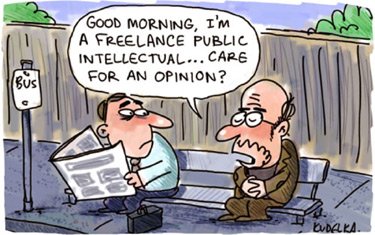
Shortly before the 2008 election, Nicholas Kristof rejoiced in the imminent election of fellow deep thinker.
If Obama is elected as now seems likely, he’ll be the first real out-of-the-closet intellectual in the White House in many years.
Laura Miller, in Salon, described Obama as about to become “one of the most literary presidents in recent memory,” and delivered evidence of his erudition.
Obama the reader blossomed as an undergraduate at Occidental College in California and, especially, during the two monkish years he spent finishing up his degree at Columbia University in New York. “I had tons of books,” he told his biographer, David Mendell (“Obama: From Promise to Power”), about this time in his life. “I read everything. I think that was the period when I grew as much as I have ever grown intellectually. But it was a very internal growth.” Even after he left New York to work as a community organizer in Chicago, Mendell reports, Obama lived so much like a retiring writer — spending many hours holed up in a spartan apartment with volumes of “philosophy and literature” — that some of his colleagues assumed he was gathering material for a novel.
A taste for serious fiction is rare in the American male these days, but Obama has it. According to several friends, he even tried his hand at writing short stories during those early years in Chicago, and he recalls priggishly scolding his half sister, Maya, while she was visiting him in New York, because she chose to watch TV instead of reading some novels he’d given her. Among the authors he favored during his years of intensive reading were Herman Melville, Toni Morrison and E.L. Doctorow (cited as his favorite before he switched to Shakespeare). He has also mentioned Philip Roth, whose struggles to shrug off the strictures of Jewish American community leaders must have resonated with the young activist.
He read a lot, we are told, back when he was in college, and his (and Ms. Miller’s) powers of critical discernment are such as to rank Toni Morrison, E.L. Doctorow, and Phillip Roth with Melville. Happily, he evidently grew to prefer Hamlet to Ragtime or The Book of Daniel.
Karl Rove testified that, during his second term, George W. Bush competed with Rove in reading, losing the contest to Rove 95 to 110 titles completed in the course of a year.
And how does the most intellectual president in modern times compare to his predecessor, a man regarded by all right-thinking establishmentarians as a light weight?
In Columbia Journalism Review, New York Times reporter Michael Powell describes getting to know Obama when he followed him around on the campaign trail.
I got talking to him about what he reads and was telling me about these different policy tomes. And I said, “Well, yeah, but come on. I’m out here on the campaign trail with you, you’re up even earlier than I am, and I’ve been carrying around this Philip Roth book with me for two months and I’m yet to even crack it.†He actually laughed at that point, and said, “Yeah, you have very little chance to really read. I basically floss my teeth and watch Sports Center.â€
They got along famously. They both love Phillip Roth, and they are both too busy to actually read him.
It must be all the reading he does that enables Obama to know so much about American history.
[H]ere in the United States, Ramadan is a reminder that Islam has always been part of America and that American Muslims have made extraordinary contributions to our country.
I’ve read very widely in that subject myself, and I’ve actually never discovered either of the two facts the president mentioned.
I can recall no Muslim presence in the United States at all before recent years, if you don’t count Shriners wearing fezes. And the only Islamic contribution to America I can think of would be the Barbary pirates supplying “To the shore of Tripoli” to the Marine Corps hymn.
Hat tip to Taegan Goddard.






